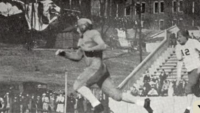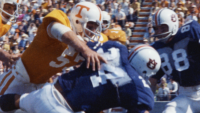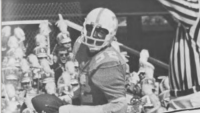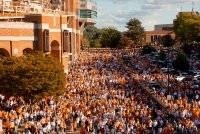StarRaider
Yes they do call me Einstein
- Joined
- Mar 6, 2008
- Messages
- 16,643
- Likes
- 42,298

Amazing!12 days…….
#12 - Beattie Feathers
From 1931-1933, Feathers led the Vols to a 25-3-2 record and revered almost 100 years later. Beattie's career rushing total, 1,888 yards, lasted 37 years as the school record. He scored 32 touchdowns in 30 career games. Feathers was a All-Southern and 3rd team All-American in 1932 and was a consensus All-America halfback and Southeastern Conference Most Valuable Player in 1933. He was known for his long touchdown runs: 1931 - 60, 75, 80 yards vs. Mississippi, 70 vs. Kentucky, 65 vs. Duke, 65 vs. New York University. 1932 - 54 vs. North Carolina, 33 vs. Mississippi. 1933 - 43 and 33 vs. Virginia Tech. In 1932 he averaged 46 yards on 23 punts in a driving rain against Alabama and scored the only touchdown in the 7-3 victory. In 1933 he made a 76-yard punt against Florida. In 2008, Sports Illustrated went back to see who would have won the “Heisman Trophy” in the years before it was awarded, and named Feathers as the sure fire winner in 1933. Consider this quote from Freddie Moses, who played with Feathers: “Beattie didn’t think in terms of first downs; only in terms of touchdowns.” Beattie would go on to an amazing NFL career, highlighted by being named to the 1930s All-Decade Team and becoming the first player in NFL history to rush for over 1,000 yards in a season. Feathers was inducted into the the College Football Hall of Fame in 1955. He would also go on to a successful career as a college football coach.
View attachment 482384
12 days…….
#12 - Beattie Feathers
From 1931-1933, Feathers led the Vols to a 25-3-2 record and revered almost 100 years later. Beattie's career rushing total, 1,888 yards, lasted 37 years as the school record. He scored 32 touchdowns in 30 career games. Feathers was a All-Southern and 3rd team All-American in 1932 and was a consensus All-America halfback and Southeastern Conference Most Valuable Player in 1933. He was known for his long touchdown runs: 1931 - 60, 75, 80 yards vs. Mississippi, 70 vs. Kentucky, 65 vs. Duke, 65 vs. New York University. 1932 - 54 vs. North Carolina, 33 vs. Mississippi. 1933 - 43 and 33 vs. Virginia Tech. In 1932 he averaged 46 yards on 23 punts in a driving rain against Alabama and scored the only touchdown in the 7-3 victory. In 1933 he made a 76-yard punt against Florida. In 2008, Sports Illustrated went back to see who would have won the “Heisman Trophy” in the years before it was awarded, and named Feathers as the sure fire winner in 1933. Consider this quote from Freddie Moses, who played with Feathers: “Beattie didn’t think in terms of first downs; only in terms of touchdowns.” Beattie would go on to an amazing NFL career, highlighted by being named to the 1930s All-Decade Team and becoming the first player in NFL history to rush for over 1,000 yards in a season. Feathers was inducted into the the College Football Hall of Fame in 1955. He would also go on to a successful career as a college football coach.
View attachment 482384

Many have tried...Stump the Peay...
Couldn’t stump him with football, so let’s try something a little different.
Where is this?
View attachment 482303

I am going to be a contrarian to some degree with Kiner. No doubt he was the most impactful linebacker of his time and I had the privilege to watch for two years his play.The combination of Kiner, Reynolds and Walker was the greatest three linebackers ever assembled in college football IMO. However, I really believe the key element to his success and of the success of all three was the play of Jack Reynolds. He simply dominated the middle to the extent that the other backers were free to move. Regardless, Peay, great job and great fun reading your work. Thanks.11 days…….
#11 - Steve Kiner
The Tampa native played from 1967-1969 and is heralded as one of the greatest linebackers in SEC history. Bear Bryant said he was the SECs best in the ‘60s. As a sophomore in 1967, Kiner helped lead UT to an SEC Championship and a #2 national ranking. He was voted the SECs sophomore of the year. In 1968, Kiner played in 8 of 10 games, due to a hand injury, but still helped UT to an 8-1-1 record. In the Ole Miss game, Steve had 12 tackles and two interceptions, despite having a broken wrist. He was named 1st Team All-SEC and was a consensus 1st Team All-American in 1968. As a senior, Kiner helped lead UT to a 9-1 record and a SEC Championship. In the Alabama game, Steve had 14 tackles, 5 TFLs, an interception, and a forced fumble. He was named national lineman of the week in the 41-14 victory. Kiner was named 1st Team All-SEC and again was a consensus All-American. He was also named SEC Defensive Player of the Year in 1969. He was everything a linebacker should be: quick and hard-hitting, with a deep love of the game. Kiner twice led the team in tackles and intercepted nine passes during his career. Ranging far and wide from his linebacker post, he set a standard for all future Vol linebackers. Kiner was a 3rd round pick by the Cowboys and played for a couple of teams until his retirement in 1978. Kiner was elected to the Tennessee Sports Hall of Fame and the College Football Hall of Fame in 1999. Steve Kiner's outstanding play at linebacker fit the tradition Tennessee holds for the position. And while playing for the Volunteers, Kiner developed a tradition of his own - domination on the field.
View attachment 482592

Solid way to start the top 1010 days…..
#10 - Jackie Walker
Walker was from Knoxville Fulton and was a linebacker from 1969-1971. Tackles were not calculated prior to 1970, but in his first season with the varsity, Walker was a starter and had two interceptions and his 27 yard return for a TD vs Alabama raised eyebrows as to how good he could be. Quick and smart, Walker was also a vicious hitter. Assistant Coach Herzbrun called him, “the hardest hitter I’ve ever seen.” Walker was named to the Sophomore All-American team. As a junior in 1970, Walker had 132 tackles, 2 sacks, caused 3 fumbles, and recovered a fumble. He also had 5 interceptions and returned 2 for TDs. He was named 1st Team All-SEC and 1st All-American. He was the first African American SEC player in history to be named All-American. As a senior, he became the first African American to be named captain of an SEC school. His 1971 season was amazing. He collected 126 tackles, forced 3 fumbles, recovered 3 fumbles, and intercepted 4 passes. He returned two of the interceptions for touchdowns. He was named 1st Team All-SEC and 1st Team All-American for the second consecutive season. In his three seasons, he had 11 interceptions and returned them for a then NCAA 5 touchdowns, and helped UT to a 30-5 record. As mentioned earlier, tackles weren’t calculated in 1969, but if so, he would have had well over 100, giving him more than 350 for his career. Walker was a 6th round pick by the 49ers, but was cut before the season started. Most know he wasn’t given the chance due to his sexual orientation. Walker was a pioneer in several areas, on and off the field. He has never garnered the recognition he deserves, not only in Knoxville, but across the SEC and the nation. The statue outside Neyland is a small start, but not nearly enough. He was inducted into the Tennessee Sports Hall of Fame in 2011, but hasn’t been voted into the hall of fame he most rightfully deserves.
View attachment 482837

The ONLY reason he's #10 is the Hall of fame thing.Solid way to start the top 10
After reading your write up, I think you made a case he could have been #1 on your list.
Also, isn’t this @Rifleman avatar photo?
Soon….
View attachment 482868
The most underrated team UT has hadFrom Wikipedia: During the 1970 season, Tennessee head coach Bill Battle (who had taken over after Dickey resigned to coach at Florida) entrusted Walker with signal-calling duties, which required reading the opposing offensive formation, and calling the play for the defense.[9] In Tennessee's 24–0 win over Alabama, Walker intercepted two passes, returning one for a touchdown, and registered two tackles-for-loss in helping his team inflict a rare shutout on a Bear Bryant-coached team.[9] A week later, Walker returned another interception for a touchdown in Tennessee's 38–7 win over Florida.[10] In Tennessee's narrow 20–18 win over South Carolina in November, Walker registered 10 tackles, including one in which he stopped a Gamecock running back short of the goal line, intercepted two passes, and recovered a fumble.[11] He finished the season with a team-leading 132 tackles (84 solo), including nine tackles-for-loss and two sacks, to go along with five interceptions.[12] Walker was named an All-American by The Football News and the National Editorial Association.[8]
Noted: The 1970 Florida Gators were coached by Doug Dickey. Their record was 7-4. Of their four losses (Alabama, Tennessee, Auburn, and Miami), none were as lopsided as the 38-7 shellacking they suffered in Knoxville. The 1970 Alabama Crimson Tide went 6-5 in the regular season, tying Oklahoma in the Astro-Bluebonnet Bowl. Their other losses were to USC 21-42, Ole Miss 23-48, LSU 9-14, and Auburn 28-33. Only Tennessee shut them out. Florida was ranked #11 and Alabama was ranked #14 when they played the Vols.
In addition to Alabama, the 1970 Volunteers shut out Kentucky (45-0) and held six teams to single digits, SMU (3), Army (3), Georgia Tech (6), Florida (7), Wake Forest (7), and Vanderbilt (6). The only aberration was their 23-36 loss to Auburn at Legion Field. In the Jan. 1, 1971 Sugar Bowl, they defeated #11 Air Force 34-13.
In the 24-0 win over Bama, the Vols defense had eight total picks. Coach Bryant is alleged to have said that Tennessee wouldn't have eight interceptions the next season because Alabama wouldn't throw the ball eight times.From Wikipedia: During the 1970 season, Tennessee head coach Bill Battle (who had taken over after Dickey resigned to coach at Florida) entrusted Walker with signal-calling duties, which required reading the opposing offensive formation, and calling the play for the defense.[9] In Tennessee's 24–0 win over Alabama, Walker intercepted two passes, returning one for a touchdown, and registered two tackles-for-loss in helping his team inflict a rare shutout on a Bear Bryant-coached team.[9] One week later, Walker returned another interception for a touchdown in Tennessee's 38–7 win over Florida.[10] In Tennessee's narrow 20–18 win over South Carolina in November, Walker registered 10 tackles, including one in which he stopped a Gamecock running back short of the goal line, intercepted two passes, and recovered a fumble.[11] He finished the season with a team-leading 132 tackles (84 solo), including nine tackles-for-loss and two sacks, to go along with five interceptions.[12] Walker was named an All-American by The Football News and the National Editorial Association.[8]
Noted: The 1970 Florida Gators were coached by Doug Dickey. Their record was 7-4. Of their four losses (Alabama, Tennessee, Auburn, and Miami), none were as lopsided as the 38-7 shellacking they suffered in Knoxville. The 1970 Alabama Crimson Tide went 6-5 in the regular season, tying Oklahoma in the Astro-Bluebonnet Bowl. Their other losses were to USC 21-42, Ole Miss 23-48, LSU 9-14, and Auburn 28-33. Only Tennessee shut them out. Florida was ranked #11 and Alabama was ranked #14 when they played the Vols.
In addition to Alabama, the 1970 Volunteers shut out Kentucky (45-0) and held six teams to single digits, SMU (3), Army (3), Georgia Tech (6), Florida (7), Wake Forest (7), and Vanderbilt (6). The only aberration was their 23-36 loss to Auburn at Legion Field. In the Jan. 1, 1971 Sugar Bowl, they defeated #11 Air Force 34-13.
was AWOL at West games in HS frequently to watch Walker while he was a Falcon10 days…..
#10 - Jackie Walker
Walker was from Knoxville Fulton and was a linebacker from 1969-1971. Tackles were not calculated prior to 1970, but in his first season with the varsity, Walker was a starter and had two interceptions and his 27 yard return for a TD vs Alabama raised eyebrows as to how good he could be. Quick and smart, Walker was also a vicious hitter. Assistant Coach Herzbrun called him, “the hardest hitter I’ve ever seen.” Walker was named to the Sophomore All-American team. As a junior in 1970, Walker had 132 tackles, 2 sacks, caused 3 fumbles, and recovered a fumble. He also had 5 interceptions and returned 2 for TDs. He was named 1st Team All-SEC and 1st All-American. He was the first African American SEC player in history to be named All-American. As a senior, he became the first African American to be named captain of an SEC school. His 1971 season was amazing. He collected 126 tackles, forced 3 fumbles, recovered 3 fumbles, and intercepted 4 passes. He returned two of the interceptions for touchdowns. He was named 1st Team All-SEC and 1st Team All-American for the second consecutive season. In his three seasons, he had 11 interceptions and returned them for a then NCAA RECORD 5 touchdowns, and helped UT to a 30-5 record. As mentioned earlier, tackles weren’t calculated in 1969, but if so, he would have had well over 100, giving him more than 350 for his career. Walker was a 6th round pick by the 49ers, but was cut before the season started. Most know he wasn’t given the chance due to his sexual orientation. Walker was a pioneer in several areas, on and off the field. He has never garnered the recognition he deserves, not only in Knoxville, but across the SEC and the nation. The statue outside Neyland is a small start, but not nearly enough. He was inducted into the Tennessee Sports Hall of Fame in 2011, but hasn’t been voted into the hall of fame he most rightfully deserves.
View attachment 482837
